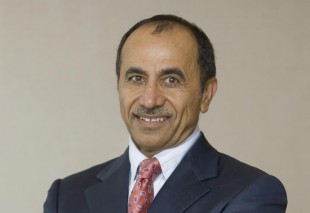

Roya CEO says the future is bright for UAE hotels

UAE National Ahmed Ramdan is well known in the UAE hospitality industry and a familiar face in Hotelier’s Power 50. Prior to setting up his consultancy in 1998, Ramdan held several roles in the business, including GM of InterContinental Dubai Creek (now Radisson) and a regional role for IHG based in Dubai. He recalls the impact of hotels on the lifestyle of people living in the UAE in the 70s and 80s…
“As far as UAE Nationals are concerned, working in hotels was not really acceptable – hotels were associated with bars and alcohol and drinking and when I went to study and work in a hotel, people, including my own father, were not very welcoming of the idea. I wanted to be different; I am a non-conformist!
In the 70s and 80s the UAE had very little international chains; initially it started with some of the local hotels running their own very small hotels [the first of which was the Airlines Hotel in Dubai in 1959]. The first international hotel chain to open in Dubai was InterContinental in 1975 – on the creek, followed by Sheraton, Hilton.
Hotels were like community centres, an attraction, being a GM of a hotel you had kind of a name. If you wanted to go to a gym, you would have needed to have been a member of one of the hotels. Hotels played very important roles with their health club, functions and food and beverage, because they provided a different type of ‘eatertainment’. Give credit to the hotels — they brought lots of stylish, high-grade products, to the market. Exhibitions in Dubai started in hotels because of the large ballrooms and then extended further. Even big weddings were encouraged by the hotels — before that people used to marry very differently. There was a lot of airline stopovers here so crew accommodation was very important. That was another thing they contributed.
It was in 1989 when Dubai really committed itself to tourism and things picked up dramatically. Hotels started to segment in 92/93 after the Iraq war when the business boomed again. The war created awareness of where we are and importance of the Gulf. Soon after the war stopped I remember we increased the prices of the hotels by three times because of the huge demand.
Article continues on next page...
Then Dubai started to segment the hotels —, urban, business, airport, resort — then Sheikh Zayed Road started to develop with the Crowne Plaza opening. But could we predict the boom of 2006/07/08? Certainly we were not predicting it would grow that fast. That was beyond anybody’s expectation.
Today the variety and quality of the hotels we have is next to none really, and I have a very critical eye and I’m a very critical person, visiting hotels all over the world. I’m happy to see that we have started to develop hotels here, we used to go across to Singapore, Hong Kong, London, Paris, New York and look at the hotel trends – today I can comfortably tell you that people come here to do that.
But certainly over the next few years you will see a tougher competition, so if you want to compete you need to differentiate your product, but I hope we will not go crazy and build something that isn’t viable, isn’t sustainable, or doesn’t make money. What the UAE will come up with is more innovative hotels, further breaking the mould of the hotel, the style, the quality — maybe we will create some of our own segments? Who says the hotel has to be built the way we are building it?
The segments will be widened; you will see a family hotel purely for families, sharia-compliant hotels, a hotel which is highly segmented to conferences and conventions.
I hope that we get more nationals into the hotels, and I’m talking for their careers, not just to be a driver, he has to be management level to contribute to the hotel, that I hope very much, my second hope is that we have more sustainable hotels.
DTCM and ADTA are both taking initiatives as we speak about Emiratisation programmes and they’re both very serious about this, subsequently this will have an impact on the northern emirates — sooner or later the authorities have to enourage more nationalisation project into hotels. That’s my wish, I hope they put some quota if it is well controlled. Putting a quota is maybe the only way we can expedite this. This has got some advantages and might have some disadvantages, but if it is managed well, I think it’s the right idea to do it.”